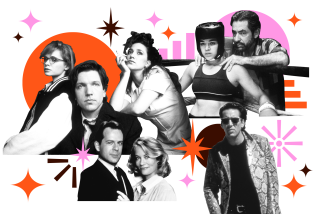Is Ultraviolet movie magic?
- Share via
After stumbling badly in their first attempts to sell downloadable versions of their films, Hollywood studios appear to be regaining their footing. At the Consumer Electronics Show in Las Vegas this month, a consortium of entertainment and technology companies unveiled Ultraviolet, a new platform for distributing content online that lets retailers sell movies and TV shows that can be watched anywhere, anytime and on many different devices. This is a huge step in the right direction for both content owners and consumers. But with millions of consumers accustomed to watching movies online for little or no cost, it remains to be seen whether Ultraviolet has arrived too late to revive downloadable movie sales.
The studios handicapped retailers’ initial efforts to sell movies online by withholding titles and using anticopying technology that made downloads incompatible with many devices. Ultraviolet was designed to solve the latter problem, giving consumers far more freedom while still accommodating the studios’ demand for piracy protection.
Expected to launch this year, UV-compatible services will offer downloadable movies and TV shows that can be copied onto as many as a dozen devices that meet the UV standard, burned onto DVDs or streamed to connected TV sets, set-top boxes, computers and smartphones running UV software. To reduce compatibility problems, the system works with the five types of anticopying technology employed by most major electronics manufacturers.
Yet the consortium still faces an uphill climb, given that consumers have filled their homes with devices that weren’t built to UV specifications and may not be able to adapt to them. (Apple is a notable holdout.) Another complication is the exclusive rights the studios sell to companies such as HBO, which may temporarily prevent people from streaming UV movies they’ve bought.
And though UV expands the options available to movie buyers, it’s burdened with a much more complex set of rules and restrictions than DVDs and Blu-ray discs. Meanwhile, easy-to-use movie streaming and digital rental services from the likes of Netflix, Amazon and CinemaNow are being built into more TVs, disc players and portable devices.
Nevertheless, the flexibility that UV offers is long overdue. It may not convert hordes of renters (or illegal downloaders) into buyers, but it brings Hollywood’s downloads more in line with what consumers expect from digital products. And most important, it gives programmers, gadget makers and online entrepreneurs more room to innovate. With home-video revenue on a three-year slide, Hollywood needs all the help on that front it can get.
More to Read
The biggest entertainment stories
Get our big stories about Hollywood, film, television, music, arts, culture and more right in your inbox as soon as they publish.
You may occasionally receive promotional content from the Los Angeles Times.










